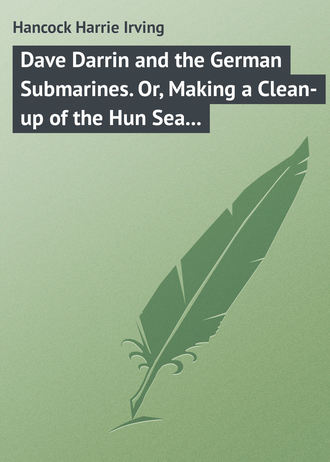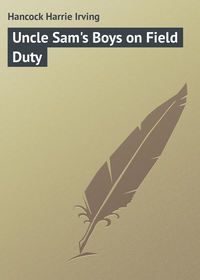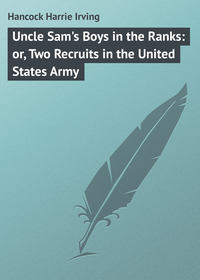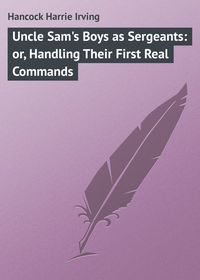 полная версия
полная версияDave Darrin and the German Submarines. Or, Making a Clean-up of the Hun Sea Monsters
That was the word constantly passed about by the “Logan’s” officers. Every sailor hoped that he might be the lucky one to discover a periscope in time to lead to the bombing of one of the pests.
Dave had reached the bridge at seven bells. Dalzell was now below, sleeping as soundly as though he were back in the old home town of Gridley. Lieutenant Curtin was on the bridge watch.
“It’s odd, Mr. Curtin, that we haven’t sighted a submarine in four days; that we haven’t had the slightest visible reason to suspect the presence of one,” Dave remarked to his subordinate officer.
“Very likely, sir, we’re too far out,” Curtin replied.
“Yet we have every reason to believe that they’ve extended the danger zone further westward,” Darrin continued.
“That’s the belief of the fleet commander,” Curtin answered, “but there’s always a chance of his having guessed wrong. Why isn’t it just as probable,” he added, in a much lower tone, “that the Huns have decided to have a try at the troopship fleet fairly close to land?”
“It wouldn’t be likely,” Dave went on, in an equally low tone. “For one thing, Mr. Curtin, the enemy would want their first try farther out. Then, if they missed, they’d have another chance, perhaps, closer to land.”
“If they missed on their first try, the Huns would have to run their submersibles on the surface in order to overtake the troopship fleet for another chance. They couldn’t travel under water and overtake the troopship fleet.”
“Quite right,” Darrin admitted in a whisper. “Still, I see another answer to the problem. Of the sixty submersibles believed to be on the job twenty may have been sent far to the westward, the other forty remaining nearer to the coast. The twenty submarines could make a desperate try. Then, if they failed, the remaining forty could take up the job closer to shore.”
“Then you don’t believe all the German submarines engaged are concentrated at one point, sir?”
“Impossible to say,” Darrin rejoined. “I don’t like to form opinions on any subject without facts to go on.”
“It’s strange; not a steamer sighted today,” Lieutenant Curtin resumed, after a few moments’ scanning of the sea. “During our first three days out we met plenty of armed freighters. Today, not a sail or a stack sighted. Can it be that the subs are further west, and that they’ve overhauled and sunk several freighters?”
“We’ve heard no appeals for help. Every freighter carries wireless apparatus in these days,” Dave argued.
“True, but sometimes the torpedo shock puts a ship’s radio out of commission from the moment of impact.”
“I do not believe that the freighters are being bothered,” Dave announced. “Granted that there are undoubtedly subs enough in these waters to raise the mischief with cargo steamers. If the subs didn’t have the luck to silence the wireless outfits on the cargo steamers at the first shot, there would be chance of word reaching the troopships of unusual danger, and that would lead to redoubled vigilance on the part of the destroyer escorts. My belief, Mr. Curtin, is that the cargo boats will have a rest until the fate of the troopship fleet has been decided.”
“Then you believe, sir, that the absence of cargo boats today is due to – ”
“Probably due to the fact that there was one slack day in clearing cargo boats at American ports, and also because of an equally slack day in British ports.”
Then fell silence. Both drowsy, despite their realization of the need of keeping awake and on the alert, both young officers moved about on the bridge, ever maintaining a sharp lookout.
They were still pacing back and forth when the sun went down below the horizon toward the distant United States. Lieutenant Beatty, fresh from a sleep, came up on the bridge, saluting his commander.
“Mr. Beatty, you’ve no other duty at present,” Darrin greeted him. “Will you do an extra bit and remain on the bridge with Curtin?”
“I’ll be very glad to, sir, for I’m feeling fit after my sleep,” replied the lieutenant, heartily.
“I’m going below for a brief doze in my chair. If I’m wanted, call down to some one to rouse me. I’ll sleep for an hour or so. But be sure, Mr. Curtin, to see to it that I’m called if anything happens, no matter how slight an occurrence it may seem to be.”
“Very good, sir,” from the smiling Curtin.
“And glad I am to give the ‘Old Man’ a bit of a relief,” quoth Beatty to his brother officer. “I never knew a commander before who spent so much of his time on deck or bridge, except in a gale. Mr. Darrin doesn’t appear to think that he needs more than a third as much sleep as other persons require.”
“He told me to call him in an hour or so,” grinned Lieutenant Curtin. “Unless something turns up his instructions will allow me to let him doze at least two hours.”
No sooner had Darrin doffed cap and sheepskin and settled back in his chair than his eyes closed and he was cruising in the Land of Nod.
Nor did he stir enough to wake until an orderly, sent from the bridge, entered and shook his right arm.
“Beg pardon, sir,” said the sailor. “The officer of the deck wants to know if you wish to be called now.”
“In another hour,” said Darrin, drowsily, and dozed off again.
Which message was received with high glee by the two conspirators for Dave’s comfort when they received the news on the bridge.
“Only one drawback to it, Curtin,” said Beatty. “When the ‘Old Man’ finally wakes he’ll imagine he can stand watch for twenty-four hours without more sleep.”
“Maybe, by that time, he’ll have to,” retorted Curtin. “So we’ll let him gather in all the rest that he can get now.”
And Darrin slept that added hour. When called the next time he rose straight to his feet.
“It was stupid of me not to wake an hour ago,” Dave reproached himself, after glancing at the clock over the desk. “But just look at dear old Danny-boy! He’s slept nearly twice as long as I have. If things remain dull this evening I won’t have him called, either. He needs the rest, poor old chap!”
Donning cap and short coat the youthful commander went out on deck and then started on a tour of inspection. Presently he neared the stern just in time to see one of the two stern lookouts leap upon the other and bear the latter to the deck. The assailant gripped his victim around the throat, administering a severe choking.
“No, you don’t!” yelled the upper man. “I caught you that time, and I’ll bet you’ve done it before. Marine guard, here – stern watch!”
A midship lookout passed the word, but Dave darted forward out of the shadows.
“Get up, Ferguson,” Darrin commanded. “Back to your post. You’ve no right to take your eyes away from your particular work. Get up, Jordan.”
The latter, the sailor who had been attacked, rose to his feet, sullenly rubbing his throat.
“Ferguson, why did you attack Jordan?” Dave demanded.
“Look astern, sir!” Seaman Ferguson replied, pointing to the wake of the destroyer. “Do you see that gleam on the water, sir? It’s something that Jordan dropped overboard. It’s some tricky, dirty work, sir, or I’ll eat my guess. I’ve known since last night, sir, that Jordan was tricky. He tried to get me to look another way to-night, but out of the corner of one eye I saw him drop something overboard – and then that thing in our wake began to gleam.”
By this time the solitary marine guard on deck duty had arrived aft. Beholding the commanding officer, the sea-soldier saluted and stood at attention.
“My man,” Dave ordered, “take my compliments to Lieutenant Curtin and my instructions that he is to make a careful turn and try to go back through our wake. He is to be very exact about going over the very wake of this craft. The message delivered, report back here.”
Jordan, who had turned deathly pale, glanced about him as if meditating some foolish flight.
“Now, Jordan,” Dave began, taking the young sailor firmly by the arm, “what was it you threw overboard?”
“A – a – ” began the accused one.
“Yes, come out with it,” Darrin commanded.
“I didn’t throw anything overboard, sir. Ferguson is a liar.”
Whereupon Seaman Ferguson, though he still kept his eyes turned in the direction imposed by his watch duties, clenched both fists hard.
“It won’t do you any good to deny, Jordan,” Dave insisted. “We’re going back and find that – whatever it was that you threw overboard. Better tell me now!”
As if to confirm his words the “Logan” began to turn in a half circle. At the same time the marine returned.
“Take Jordan below. See that he’s searched and then confined in the brig,” Dave directed.
With infinite care the “Logan” sought her recent wake. It was no simple task on such a night, when the new moon had already set. And, travelling at such easy speed, the “Logan” had not stirred up anything like the foamy, suds-like wake that trailed after her when she steamed at fighting speed.
By the time the turn was made the glowing object that Ferguson had pointed out was no longer visible. Carefully the destroyer picked her way back. They were a bit out of the straight line, though, as Darrin presently found reason to believe, for a tiny glow, looking like a point of dim light in the near distance, was finally sighted about three points off the port bow.
“Two points to port,” Dave passed the word. He was now well up forward of the bridge, watching the surface of the ocean intently. “Steady! Stop!.. Half speed astern… Stop!”
The glowing object was now in plain sight as it tossed on the swells. Darrin gave the order to lower a cutter, instructing Ensign Phelps to go along and haul in that glowing object.
There was no need to watch it from the “Logan.” Mr. Phelps, from the cutter, could make it out distinctly. Soon he reached it, a seaman bending over the side and picking up the object.
“Pass it to me at once,” directed the ensign, and an instant later took possession of it. By the time the boat had been hoisted to the davits Mr. Phelps leaped down to the deck and joined his commander.
“Did you observe, sir? This thing glowed, while in the water,” declared the ensign, holding up a bottle of about a pint capacity, tightly closed with a rubber stopper. “Yet when I got it in out of the water it stopped glowing, and looked as dull and dark as it does now. I believe it’s coated with a transparent substance that glows only when the thing is in the water. Have I your permission, sir, to drop it in a fire bucket and see?”
“Go ahead,” Dave assented.
Phelps walked to a near-by fire bucket and thrust the bottle in the water. At first nothing happened. After a few seconds, however, the bottle began to glow dimly, then gradually increased in brightness until it became clear and mellow.
“That’s enough for that,” Darrin nodded. “Now bring it into the chart-room, Mr. Phelps, and we’ll look it over.”
Their entrance awoke Dalzell, who stretched, then sprang up.
Dave hastily explained to his chum what had happened, at the same time going to the desk and turning on a stronger electric light.
Holding the bottle up against the light, Dave was able to make out what looked like a folded piece of paper in it, nothing else.
“At all events,” smiled Dave, as he seated himself before the desk and glanced through the bottle glass, “I do not see any reason to believe that I shall set off any explosive by drawing out the rubber stopper.”
Nothing disastrous happened as the stopper was withdrawn. Holding the bottle up to the light once more, peering through the neck, Darrin saw that it contained only the folded paper. Careful work with a penholder consumed five minutes of time before the paper was pried out, whole.
Dave spread it on the desk before him,
“Phelps, you read German better than I do, I believe.”
“I can make a stagger at it, sir.”
“Look this through and translate for me,” Darrin requested.
Slowly, and with a good deal of care, Phelps translated in these words:
“U. S. Destroyer ‘Logan.’ 8.15 P. M. (Date) Longitude – ; latitude – . Course, west by southwest. Carries three times usual amount of ammunition. Speed, eight knots.”
The actual date was given; longitude and latitude were correct enough.
When Phelps had finished reading Dave Darrin leaned back in his chair, pain expressed in his face and eyes.
“A traitor on board! An American on this craft who has sold himself to the Huns! In the name of mercy how can such a thing be?”
CHAPTER VII – DARRIN HAS A SPY SCARE
“Tell the orderly to pass the word to the marine corporal to bring Jordan here,” Dave ordered, after a dazed instant.
That order was quickly obeyed. Seaman Jordan, shuffling his feet, his eyes roving shiftily, nevertheless maintained a half-defiant, half-injured air.
“Jordan,” demanded Dave, without a moment’s waiting, as the man was placed before him, “why did you drop this bottle overboard?”
“I didn’t, sir.”
“But Ferguson says you did.”
“He’s a liar, sir.”
“Where did you get this bottle?” Dave rapped out.
“I didn’t get it, sir; I never saw it before.”
“Have you any more of these bottles?”
“Naturally not, sir.”
“What is the transparent coating on this bottle that makes it glow soon after it reaches the water?”
“I don’t know anything about it, sir.”
“Jordan, don’t you know that, in maintaining this defiant attitude, you are only injuring your own case?” Darrin demanded, warningly.
“I can’t tell you anything else than I’m telling you, sir,” the sailor cried, angrily. “I have been telling you the truth and I won’t lie, sir.”
“I don’t ask you to lie,” Darrin observed coolly.
“But you won’t believe me, sir.”
“No,” said Dave, rising. “I don’t. Corporal, take this man back to the brig. And see to it that you don’t repeat anything that you have heard here. As you go out pass the word by messenger to the officer of the deck to have Seaman Ferguson relieved. As soon as that is done Ferguson is to report to me here.”
So swiftly are orders carried out on a destroyer in war-time that it was less than a minute later when Ferguson knocked, entered, saluted, and stood, cap in hand, before his commanding officer.
“Ferguson,” Dave began, “outside of your being stationed with him, have you seen much of Jordan?”
“About as much, sir, as I see of any shipmate who isn’t any particular friend of mine.”
“Have you been on unfriendly terms with Jordan?”
“Not until I caught him at tricks to-night, sir.”
“Ever had any trouble with Jordan?”
“Fought him twice, I think, sir.”
“Any bad blood between you two?”
“No, sir; that is, nothing more than disputes that blew over at once after we had used our fists on each other.”
“Who won the fights?”
“I did, sir.”
“And you have not looked upon Jordan as an enemy?”
“No, sir.”
“What has been your opinion of Jordan as a seaman?”
“He always seemed to know his business, sir.”
“Did he perform his duties cheerfully?”
“I thought so,” Ferguson replied.
“Now, Ferguson,” Darrin went on, “you two have chatted quite a bit, haven’t you, when on station side by side?”
“Yes, sir, whenever we found the time hanging heavy on our hands.”
“What did you talk about?”
“Sometimes, sir, we talked about the fun that can be had on shore leave, but more often about submarines and the war, sir.”
“And what was Jordan’s attitude toward the war?”
“I don’t know that I understand you, sir.”
“Did Jordan speak as if he believed the United States did right to enter the war?”
“Oh, yes, sir.”
“He talked, did he, like what you would call a good American?”
“Yes, sir; always, when the subject was mentioned.”
“And you believed him loyal to the United States?”
“Yes, sir; up to last night.”
“What happened then?”
“Why, sir, Jordan got me to look off to starboard, and my back was turned to him for a moment. I felt, rather than saw, that he had dropped something overboard. I looked quickly astern at our wake. I now feel pretty sure, sir, that I saw something glowing floating on the water astern. You may remember, sir, that at this time last night there was a heavy phosphorescent wake. And we were making faster speed last night, too, and our propeller turned up more of the phosphorescent stuff in the water, if that is the right way to express it, sir.”
Darrin nodded his comprehension of the description, and went on:
“Last night was the first time you had any suspicion of Jordan?”
“Yes, sir.”
“Did he do anything further last night to arouse your suspicion?”
“No, sir.”
“Did you watch him?”
“Yes, sir; like a hawk. But I’m pretty sure that he didn’t know I was watching him.”
“Did you report your suspicions to any officer?”
“No, sir.”
“Why not?”
“Because I didn’t have anything but a hazy suspicion to report, sir, and I wouldn’t like to carry tales or rouse suspicion against a chap who might be altogether decent.”
“Then your previous fights with Jordan didn’t cause you to dislike or suspect the man?”
“Certainly not, sir. I don’t fight that way. When I’ve a bit of a scrap with a mate, sir, the fight is over, with me, when it stops.”
“Yet you felt that you should keep an eye on Jordan to-night?”
“Yes, sir.”
“And you believe that Jordan dropped this bottle overboard into our wake?”
“I’m positive that he did, sir.”
“Did you see him do it?”
“No, sir,” Ferguson replied, without hesitation.
Dave Darrin had followed a style of questioning that is common to the Army and the Navy when one enlisted man makes a report against another enlisted man. Dave’s first object was to make sure that there was no really bad blood between the men, and that the charge wasn’t merely a matter of getting square. Secondly, Darrin was trying to make up his mind as to Ferguson’s keenness and reliability as a witness. By this time he had made up his mind that Seaman Ferguson was telling the truth according to his best knowledge of what had happened, and that he had spoken without prejudice.
“Ferguson,” said the young destroyer commander, promptly, “I am satisfied that you have answered me truthfully. I also commend you for your prompt action to-night. As to your failure to make a report of your suspicions last night I believe that you have justified yourself.”
“Thank you, sir. If I may, I would like to ask the lieutenant-commander a question.”
This way of putting it, addressing Dave in the third person, is quite in keeping with the custom of the service.
“You may ask the question,” Dave nodded.
“Then I would like to ask the lieutenant-commander, sir, if I would have done better to have reported my suspicions last night?”
“It is impossible to answer that question for every case that might arise,” Dave told him. “Navy men, whether enlisted or commissioned, dislike tale-bearers. In war-time, however, and under peculiar conditions where extreme peril always lurks, and where the act of a spy may destroy a ship’s company in a twinkling of an eye, it is usually permissible to report even vague suspicions. The officer to whom such a report is made will quickly discover that it is probably only a vague suspicion, and then he will not be unduly prejudiced against the suspected man.”
“Thank you, sir.”
“Do not talk this over with your mates, Ferguson. The less that is said about the matter for the present the better I shall like it. That is all for the present. You have done a good bit of work, Ferguson.”
“I thank the lieutenant-commander.”
At a nod from Darrin the seaman saluted and withdrew.
For the next five minutes Dave sat, alternately scanning the message and studying the appearance of the bottle. At last he looked up at his brother officers.
“Mr. Phelps, you will make it your next duty to search Jordan’s effects. In his duffle bag or hammock space you may find more of these bottles. If you do not, you will extend your search further, as your judgment dictates. If there are any more of these bottles on board I wish them found and turned over to me.”
After the ensign had gone Dan drew on his sheepskin.
“After this spy scare,” he announced, “I’m off to make an inspection. Perhaps I may find something connected with this matter.”
“If you go by the brig, Danny-boy, you might tell Jordan that at any time when he wants to open up and speak the truth he may send in word.”
“Very good, sir.”
Left by himself Darrin went to a filing case, turned to “J” and brought forth Jordan’s descriptive card. This is a card that contains full information as to an enlisted man’s name, his age, a personal description, extent and kind of service, education, qualifications, disciplinary record, the grades in which he has served, the ships and shore stations on or at which he has served, and more information along similar lines.
Jordan’s card showed that the arrested man had joined the Navy five years before, as an apprentice, at the age of nineteen; his work had always been well done; he had never been in serious trouble; his reputation was good. His home address was given and the names of his parents stated.
“No help from this source,” Dave mused, as he returned the card to its proper place in the drawer. “Assuming that Jordan is guilty, then Jordan is not his real name, and he’s really a German, not an American. For Jordan’s treachery might cause the sudden destruction of this craft, and no American, no matter how bad, would sell out for mere money when he knew his treachery was likely to result in his own sudden death. No American, good, bad or indifferent, would be capable of such devotion to Germany, but a German would. Therefore I suspect that Jordan is really a German, who enlisted under a false name. It may even be that German authorities, foreseeing the coming of the war, and suspecting that the United States might be drawn into it, ordered this young fellow to enlist in peace times that he might be at hand as a spy when trouble did break out. If that is true of Jordan, I wonder how many other German spies also succeeded in enlisting in our Navy before Germany went to war at all? Jupiter, but that’s a startling question! For that matter, have we other German spies aboard the ‘Logan?’”
The idea was enough to cause Darrin to settle back in his chair, a prey to rushing thoughts.
CHAPTER VIII – THE BATTLE FOR THE TROOPSHIP FLEET
Earlier that same evening a group of Uncle Sam’s soldiers stood at the bow of a steamship. Back of them, on the spar deck, other groups lined the rails on both sides.
For some minutes there had been silence, but at last one of the group in the bow spoke.
“Late to-night I expect that we shall enter the outer edge of the Danger Zone.”
“If the Huns and their subs are there to meet us it will kill a lot of the monotony,” declared another soldier.
“I wonder if the Huns will put up any real excitement for us in that line,” said a third.
“Getting nervous, Pete?” asked the first speaker, with a short laugh.
“Not a bit,” replied Pete, hiding a yawn with his left hand.
“Nothing to get nervous about,” spoke up a fourth soldier. “The Huns are bully at sinking unarmed freighters, but so far, if they know anything about getting convoyed troopships they haven’t used much of their knowledge.”
“Still, they do get a troopship once in a while,” spoke up another soldier, in a serious tone. “They may get us.”
“Won’t amount to much if they do,” declared Pete, boldly. “Some of us would get off in the boats, and the rest of us would drop into the water with our life-belts on. Then we’d soon be picked up by a destroyer and we’d be all right again. Pooh! This so-called submarine ‘menace’ makes me tired. With all their submarines and all their bluster the Huns don’t do enough damage to our troopships to make it worth all the bother they have to take.”
“Anybody going to stay awake all night, to see if we get it during the dark hours?” inquired another.
“No; what’s the use? If we don’t get hit there is no use in losing our sleep. If we do get hit there’s always plenty of time for the men to turn out and fit their life-belts on.”
“If I thought we’d be attacked during the dark hours I’d like to stay up here on deck to-night and be on hand to see what happens when the attack comes,” said a soldier in a group that was moving bow-ward from the port rail.
“Forget it,” advised a corporal. “The guard would chase you below if you tried to stay on deck. After ‘hammocks’ is sounded no man is allowed on deck unless he is on duty. If there is an attack to-night the guard will have all the fun to divide with the forward gun-crew.”









